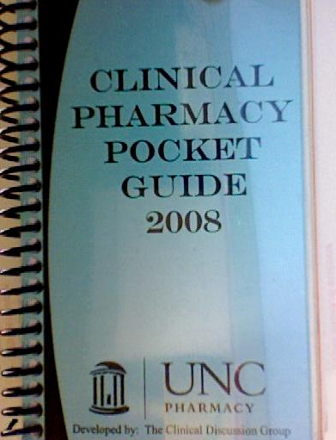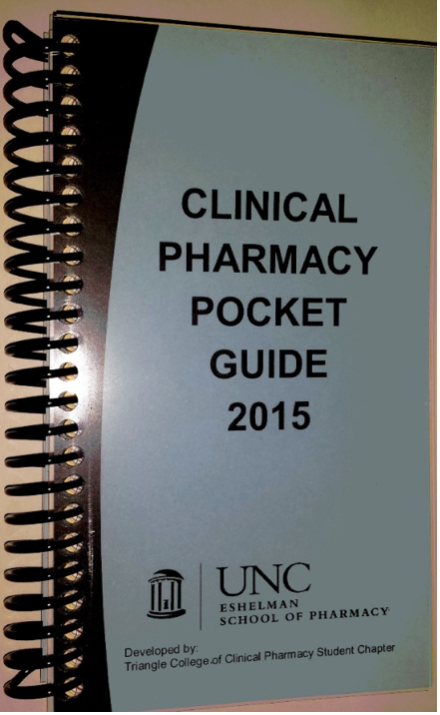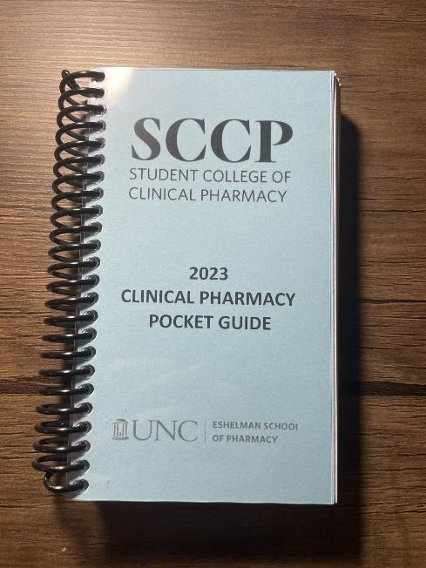Since 2006, the Student College of Clinical Pharmacy (SCCP) chapter at the University of North Carolina at Chapel Hill has published a Clinical Pharmacy Pocket Guide. Complete with over 20 topics and over 300 pages of content, this 4- by 6-inch guide is a helpful resource for both students and clinicians. The guide is updated annually to incorporate newly published guidelines and primary literature. For each section of content, a faculty expert and two or three student members of the chapter are recruited to update and improve the guide. Twenty-four faculty members and 52 student members helped edit the most recently published edition of the pocket guide. Topics included in the guide range from common chronic conditions such as hypertension and diabetes to topics for the acute setting such as sepsis and alcohol withdrawal syndrome.
 Pocket Guide 2008
Pocket Guide 2008 Pocket Guide 2015
Pocket Guide 2015 Most Recent Pocket Guide
Most Recent Pocket GuideCaption: The Clinical Pharmacy Pocket Guide through the years.
Caption: The Clinical Pharmacy Pocket Guide through the years.
For those unable to attend the 2023 ACCP Annual Meeting, the conference started Saturday morning with the Student Chapter Forum. We discussed all things student related, including how students can become more involved, and introduced our 2023–2024 Student Network Advisory Committee (SNAC) so that everyone could know a friendly face! We also were able to present the University of Nebraska Medical Center College of Pharmacy (UNMC) with the 2023 Outstanding Student Chapter of the Year Award!
Chapter representatives Austin Johnson and Madison Suckstorf kicked off the Student Chapter Forum by highlighting some of the amazing things their chapter had done to stand out during the 2022–2023 academic year. They provided information in each of the five categories outlined in the Outstanding Student Chapter award: patient care, clinical research, education, advocacy, and interprofessionalism. Their presentation provided other student leaders with information, ideas, and inspiration to bring back to their chapters!
UNMC is a smaller pharmacy school with 190 students. Despite a smaller student body, they have 83 members spread among first- through fourth-year students. Each month, they have chapter meetings where they host a variety of guest speakers from different areas of clinical pharmacy. Pharmacists discuss the path that led them to their specialty, the current roles and responsibilities in their practice, and the anticipated opportunities within the field. Examples of speakers they host include pharmacists from emergency medicine, pediatrics, pain and opioid stewardship, oncology, infectious disease, and immunology.
UNMC focuses on patient care by participating in the SHARING Clinics, a student-run clinic that provides free, multidisciplinary health care to underprivileged populations within the Omaha, Nebraska, community. Students volunteer weekly, and this past year, 15 of UNMC’s ACCP members participated in the continuity program through the clinic, where they served to provide longitudinal care to assigned patients throughout the year. They are also heavily involved in clinical research at UNMC, and there were even seven students at the Annual Meeting this year presenting research. UNMC is committed to improving health care through research and had a robust participation in the Clinical Research Challenge earlier this year with 26 students competing across nine teams!
The UNMC student chapter focuses on education by hosting several events throughout the year to aid in students’ professional development. This year, these events included career path roundtables, which were adopted from ACCP; pharmacist-led journal clubs to help students better interpret and conduct journal clubs before their P4 rotations; and a P4 residency panel to offer advice on how to navigate the residency application process. UNMC offers a P1 executive position in their chapter to provide the opportunity for a first-year student to gain skills in organization and leadership. They also have a peer-to-peer mental health support service where third- and fourth-year students who are trained in mental health first aid provide counseling services to students at the college of pharmacy as part of their advocacy platform. Finally, UNMC is involved in an interprofessional education day in which they collaborate with other health professionals to learn more about the strengths and perspectives each profession has to offer.
UNMC is more than deserving of the 2023 ACCP Outstanding Student Chapter of the Year Award! Hopefully, you can take some new ideas from the UNMC student chapter and apply them to your student chapter. Congratulations again to the University of Nebraska Medical Center College of Pharmacy!
The Clinical Pharmacy Pocket Guide through the years – One of the earliest editions from 2008 (left), the 2015 edition (middle), and the most recently published edition (right).
In addition to providing a learning opportunity for its student members, the Clinical Pharmacy Pocket Guide supports events for its SCCP chapter through sales to students and pharmacists throughout the nation. In 2022–2023, the chapter at University of North Carolina at Chapel Hill shipped pocket guides to schools and health systems in over 25 states and sold over 1100 copies. Revenue from these guides has supported several events connecting students to expert pharmacists. Examples of these events include Lunch and Learn special topic sessions and the annual Clinical Pharmacy Practitioner dinner co-hosted with the Carolina Association of Pharmacy Students student organization.
The revenue has also supported events for the chapter’s three Student Practice and Research Networks (S-PRNs), which include Critical Care, Hematology and Oncology, and Ambulatory Care. The S-PRNs have been able to host unique and engaging events, such as the Critical Care PRN’s “Don’t Let a Code Blue Become a Code Boo! An Introductory Code Blue Workshop.” During this event, students learned from PGY1 and PGY2 residents from the University of North Carolina Medical Center and received hands-on practice with medications used during adult codes. Residents shared their experiences from code situations and offered advice for students in attendance, who ranged from first- to third-year students.
For the 2023–2024 year, the chapter’s pocket guide team is working to improve the guide in additional ways. Through the recruitment of student members as designers, the team hopes to improve editing consistency, reduce the chance of errors, and expand interprofessional and international outreach. The team is also soliciting feedback from students and practitioners who purchased the guide to learn how to improve it for readers going forward.
The SCCP chapter at the University of North Carolina at Chapel Hill looks forward to publishing more editions and expanding the outreach of the pocket guide. The pocket guide team greatly appreciates the efforts by its student editors and faculty reviewers in providing updates to the guide and the support provided by those who purchase it. As membership in the chapter and interest for the pocket guide grows, the pocket guide team is excited to see how this initiative evolves in the future.